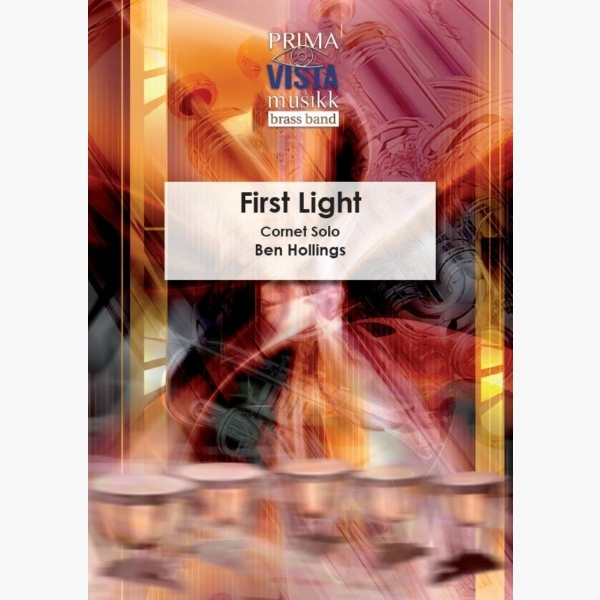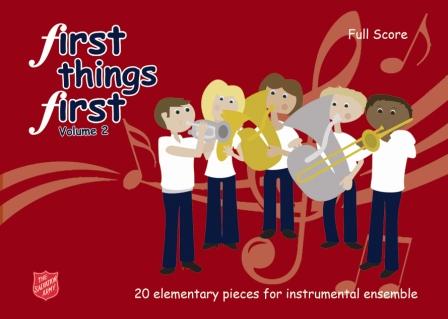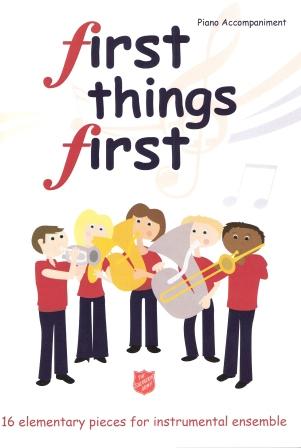Results
-
 £24.95
£24.95First Light - Ben Hollings
First Light was written for Kirsty Abbotts and Carlton Main Frickley Colliery Band. A slow lilting melody is presented in the cornet solo and passed between the band and the soloist to create images of the tranquil night before the...
Estimated dispatch 5-7 working days
-
 £76.99
£76.99The Kingdom of God - Jerry B. Bensman
A brilliant concert-march in the best British martial tradition. Both the title and composition are based on the well-known hymn 'Seek Ye First the Kingdom of God'. Jerry B. Bensman schreef deze concertmars om zijn bands, die hij destijds dirigeerde, aan het werk te zetten. Met name de trombones en bassen moeten in deze mars (technisch gezien) aan de bak. Deze mars is dan ook een uitdaging voor de orkesten in de hogere divisies. Bensman maakt in deze mars gebruik van het lied 'Seek ye first the Kingdom of God' (Zoek eerst het Koninkrijk van God). De mars is daarom bij uitstek geschikt als muzikaal intermezzo in kerkdiensten en kerkconcerten.
Estimated dispatch 5-14 working days
-
£54.99
First Jazz - André Waignein
First Jazz, a fine swinging piece, was written by Roland Kernen, who is the composer and arranger of a great deal of successful concert band music. It's a cheerful piece in ABA form for four-part variable instrumentation and additional percussion. It is very suitable for beginners who want to play light music and the swing style will appeal to the musicians as well as the audience.
Estimated dispatch 5-14 working days
-
 £53.50
£53.50First Jazz (Brass Band - Score and Parts)
First Jazz, a fine swinging piece, was written by Roland Kernen, who is the composer and arranger of a great deal of successful concert band music. It's a cheerful piece in ABA form for four-part variable instrumentation and additional percussion. It is very suitable for beginners who want to play light music and the swing style will appeal to the musicians as well as the audience. 02:00
Estimated dispatch 7-14 working days
-
 £35.00
£35.00The Alchymist's Journal (Brass Band - Score only) - Hesketh, Kenneth
2015 National Championships Finals Testpiece - First Section - Extra score only.The Alchymist's Journal, subtitled Variants for brass band, was commissioned in 2001 by the Brass Band Heritage Trust and is dedicated to Paul Hindmarsh. This vibrant music is cast in the form of a series of extended symphonic variations based on a short theme heard at the start. After a quiet start, the music builds to an incisive and dramatic climax. Ideal for any First Section brass band contest.Suitable for 1st Section Bands and upDuration: 12 minutes
Estimated dispatch 7-14 working days
-
 £19.95
£19.95First Things First Vol.2 Full Score
Following the success of Volume 1, here is Volume 2 containing 20 new pieces:Chorus Arrangement - Clap your Hands (Derick Kane)Easter Intrada (Nicholas Samuel)Father, we adore you ((Ralph Pearce)March - Give thanks to the Lord (Trevor Davis)Happy all the time (Martin Cordner)March - Hold On! (Erik Silfverberg)Holy Ground (Trevor Davis)Prelude - In this place (Nicholas Samuel)Marching Saints (Ralph Pearce)New Life (Ray Steadman-Allen)Intrada - O come. all ye faithful (Andrew Blyth)Send the Fire! (Erik Silfverberg)Soon and very soon (Derick Kane)March - Stand up for Jesus (Noel Jones)Song Arrangement - Thank You! ((Andrew Blyth)The Lord's my shepherd (Ray Steadman-Allen)There is a redeemer (Dean Jones)We give thanks (Ralph Pearce)Winter's Rock! (Andrew Blyth)Wonderful Lord (Martin Cordner)
Estimated dispatch 7-14 working days
-
 £29.95
£29.95With His First Breath - Paul Lovatt-Cooper
"With His First Breath" is the lovely slow melody taken from the middle movement of my larger work Breath of Souls. It has been composed for performance by any B-flat soloist within the ensemble - Cornet, Euphonium, Baritone, Flugel or Trombone.
Estimated dispatch 5-7 working days
-
 £4.99
£4.99First Things First Vol. 1 Piano Accompaniment
The Piano Accompaniment book includes all four essential parts in piano format to accompany, or rehearse, the performers.
Estimated dispatch 7-14 working days
-
 £69.00
£69.00First steps on stage - Peter Goosensen
First steps on stage' is especially intended for beginning wind orchestras. This piece can be used to playfully master music making in an orchestra or ensemble. The composition consists of three parts that together provide a varied and attractive composition.
Estimated dispatch 5-14 working days
-
 £54.99
£54.99My First Solo - Jerry B. Bensman
You only have had a couple of months of lessons and already you are to play a solo at your band's annual gala concert. in a big concerthall, on a huge platform and in front of people from your own town or village. Now there's something ! This circumstance inspired Jerry Bensman into writing your very first solo piece with band accompaniment. The solo part may be played by various instruments and was kept very simple indeed. Parts are available in various transpositions and keys.
Estimated dispatch 5-14 working days
